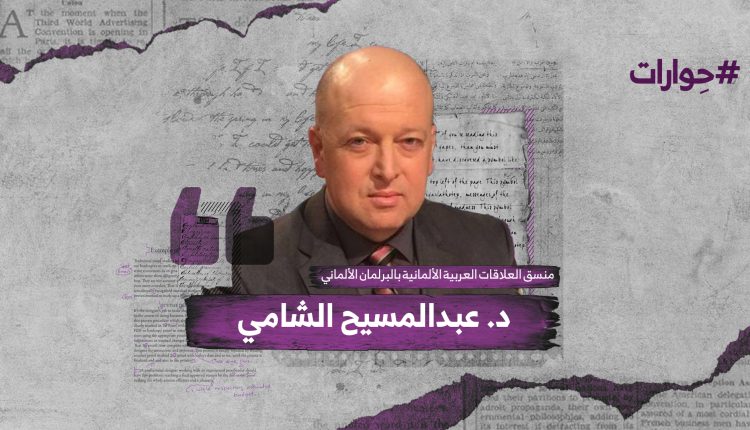Arab-German relations coordinator in the German Parliament: Berlin discusses the gradual removal of Turkish Imams in a bid to counteract extremist ideologies
Over the past few days, the German Ministry of the Interior announced a plan to phase out the Imams coming from Turkey, amid non-stop accusations – according to German media reports – of the involvement of these Imams in spreading extremist ideology and values that contradict the nature of German society, and even possibly acting as spies for the Turkish state.
According to a statement from the German Interior Ministry, the plan will see a pivot towards Imams who speak the German language and can educate generations on the values of German society as well as have a role in matters of religious dialogues. Towards that, 100 Imams will be trained annually to replace about 1,000 Turkish Imams.
To find out about the motives for and background of this decision, Target Media Platform interviewed Dr. Abdul Masih Al-Shami, the Arab-German relations coordinator of the German Parliament and international relations expert, who explained that for the past three years, the German authorities have been planning this to combat extremism. Within this, of particular importance are these Imams, what they are doing, and their links with the Turkish state. He explained that the matter is not limited to the issue of Turkish Imams.
Interview:
Q: What is your analysis of Germany’s steps to gradually phase out Imams from Turkey?
A: Three years ago, decisions were issued by the German Parliament to study the extremism in the German community after 2015. This came as a result of the entry of many extremists through the wave of refugees in that period. That was the wave Turkey exploited to send a huge number of ISIS, as well as Imams under different names. The most dangerous thing is that there are also sleeper cells of terrorist groups, whether in Germany or Europe. All of this was done mainly through the wave of refugees coming from Turkish territory. The thing is that through this refugee wave, these Imams, extremists, spies, and conspirators with the Turkish state were also introduced into many mosques. Extremist Islamic groups exist under many different names; they formed many associations, organizations, and unions.
Do you think that Turkey is exploiting the Turkish community and its influence in Germany to implement its plans and agenda?
Turkey has benefited from the phenomenon of Turks living in Germany. They number 4 to 5 million and have built a support area for extremist groups in coordination with and with funding from the Turkish state – and with the direct support of Turkish President Recep Tayyip Erdogan. Therefore, the matter is not only limited to the issue of Imams but comes within the context of a program to eradicate these terrorist groups and extremist ideology in one way or another.
What strategies has Berlin employed to address this threat?
During the last 3 years, special projects and programs have been developed within the Interior Ministry, police departments, security personnel, and detectives in Germany to confront these organizations. One year ago, a large group of leaders of these organizations, unions, and some members of the Muslim Brotherhood were expelled, including Ibrahim Al-Zayyat. He is one of the leaders of the international organization of the Egyptian Brotherhood. The activity of these groups has been greatly curtailed.
What exactly is going on through these mosques and Turkish imams?
It is known that some mosques, especially those with Turkish imams or Imams with ties to the Turks, constitute spy cells, conspiracy cells, and terrorist cells that are spreading extremism and establish gatherings for large numbers of extremists with ISIS-Salafi ideology. They have been monitored for some time.
Did these groups exploit the democratic system and freedoms present in Germany?
Indeed, and this is the problem. If those people take advantage of the democratic conditions in the country, they are constantly under surveillance. In general, there is a great deal of undercover work and mobilization from all the security services. Large numbers of senior security officers and soldiers, as well as specialists in this field, have worked to monitor and follow up on these activities over the past years.
What are the primary goals of the plan you mentioned to address the issue?
This comes within the framework of a gradual plan that is done sensibly and – as I said – it began 3 years ago. We are working to phase out Islamic extremism in Germany and the Imams who are the most dangerous; because most of them are in direct contact with the Turkish state, and security apparatus in Turkey. They spy on many Turks who are opposed to the Turkish state. Some of them spy on the German state, because a large part of them were able to penetrate state institutions and agencies, through recruiting Turks from the old Turkish community in German territory. Through this, they infiltrated the security services some time ago, and now the German state is working to eradicate this group from the country.
Why is the Ministry of Interior gradually discontinuing Turkish Imams instead of making an immediate and decisive decision?
The German authorities have followed a gradual approach that is not harsh and not too cruel so that there is no resentment or backlash by Muslim communities against the authorities. The process of combating extremism in Germany is gradual. I believe that one of the most important steps taking place today is to remove these Imams, who were the most dangerous link in this chain.
What led you to characterize them as the most dangerous?
Because those Imams control Islamic centers, mosques, and associations, and they have significant funding to support mosques and Islamic activities. Therefore, they exploited this to form extremist groups and sleeper cells, carry out espionage operations, and spread extremist ideology: these things were the reason for the current trend of the German authorities towards gradually stopping the recruitment of Imams coming from Turkey.

